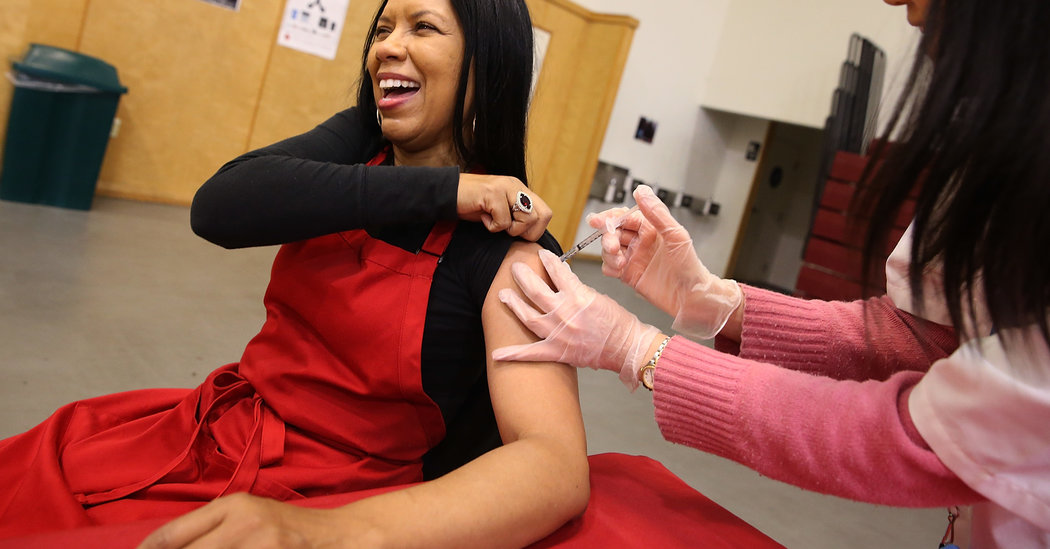
Millions of pregnant women in the United States are not getting two vital vaccines that protect not only their health, but their babies, the Centers for Disease Control and Prevention said Tuesday.
The vaccines — against flu and whooping cough — are strongly recommended during every pregnancy. But only about 35 percent of pregnant women in the country are receiving both vaccines, according to a new C.D.C. report, and just over half receive one.
The consequences of missing vaccines for flu and whooping cough, also called pertussis, can be dire.
“Influenza and pertussis, or whooping cough, are serious infections that can be deadly for babies, especially for those who are too young to be vaccinated directly,” said Dr. Anne Schuchat, principal deputy director of the C.D.C. in a briefing. “We are stressing the importance of two safe and effective vaccines for pregnant women and the risks to both women and their babies when these vaccines are not given during pregnancy.”
[For more information on what vaccines you need during pregnancy, read this guide from NYT Parenting.]
Whooping cough can be fatal, especially for babies, who cannot get their first vaccine against it until they are two months old. The C.D.C. report said that about 70 percent of people who died from whooping cough in recent years were infants younger than two months.
“When infants get whooping cough they are usually very sick and have difficulty breathing, eating, drinking or sleeping,” Dr. Schuchat said. “Parents may see their baby gasping for air and even turning blue from lack of oxygen.”
When a woman receives the whooping cough vaccine during pregnancy, antibodies are transmitted to the fetus. Those antibodies protect babies when they are born until they can build up their own immunity from a series of five immunizations against the disease. The report said that if women receive the vaccination early in the third trimester of pregnancy, it gives their newborns optimal protection and will prevent nearly 80 percent of whooping cough cases in babies under two months old.
Flu can be particularly risky for pregnant women and can cause complications like premature birth. The report found that pregnant women account for about a quarter to a third of women of reproductive age who are hospitalized for influenza — even though only about 9 percent of women in that age group are pregnant in any given year.
Babies younger than six months — the age at which they can receive their first flu vaccine — are hospitalized from flu much more often than older children and are at greater risk of dying from it. Dr. Schuchat said infants with flu can develop problems like pneumonia, dehydration and swelling of the brain.
“Maternal immunization rates have been steadfastly stuck at about 50 percent,” said Dr. Denise Jamieson, chairwoman of the department of gynecology and obstetrics at Emory University School of Medicine, who was not involved in the new report. “We really haven’t moved the needle at all.”
The new report analyzed data on hospitalization and death from flu and whooping cough between 2010 and 2018. The researchers also conducted an online survey this past spring of about 2,600 women who reported being pregnant any time since August 2018. It asked whether the women’s health care providers recommended the vaccines, either by offering to provide them or referring the patients to someone who could, and whether the women agreed to get vaccinated.
About three-quarters of the women surveyed said that during pregnancy their providers recommended the flu vaccine and the Tdap vaccine, which protects against whooping cough, tetanus and diphtheria. But even among those women, about a third did not get vaccinated, the report said.
The most common reason the women gave for not getting the flu vaccine was a belief it was not effective. The reason they gave most often for not getting the Tdap vaccine was not knowing it is necessary during each pregnancy. For both vaccines, the second most common reason women refused it was concern about whether it was safe for their babies, the report said.
Dr. Jamieson, a former C.D.C. official who now practices obstetrics and gynecology at Grady Memorial Hospital, said that pregnant patients in her practice who declined to get the flu vaccine often said, “they heard bad things about the vaccine, misconceptions that it makes you sick or wasn’t safe,” she said. Some didn’t think they were at risk for flu she said.
Dr. Jamieson said women were generally more likely to accept the Tdap vaccine, possibly because it is newer so there are fewer misconceptions about it. The flu vaccine has been recommended in pregnancy since 1960, Dr. Jamieson said, but the Tdap has only been recommended for pregnant women since 2012.
The report found that African-American women were less likely than women of other races to be vaccinated and were less likely to report that their providers offered them or referred them for vaccination. Women who were uninsured, poor or living in the South were also less likely to be advised they should get the flu vaccine. Women age 35 or older and working women were less likely to have received a recommendation for a whooping cough vaccine, although the report did not explain why.
Vaccines for flu and whooping cough are the only two immunizations recommended for all pregnant women, according to the American College of Obstetricians and Gynecologists, which posts a list of vaccines that are considered unsafe in pregnancy and others that can be given under certain circumstances.

